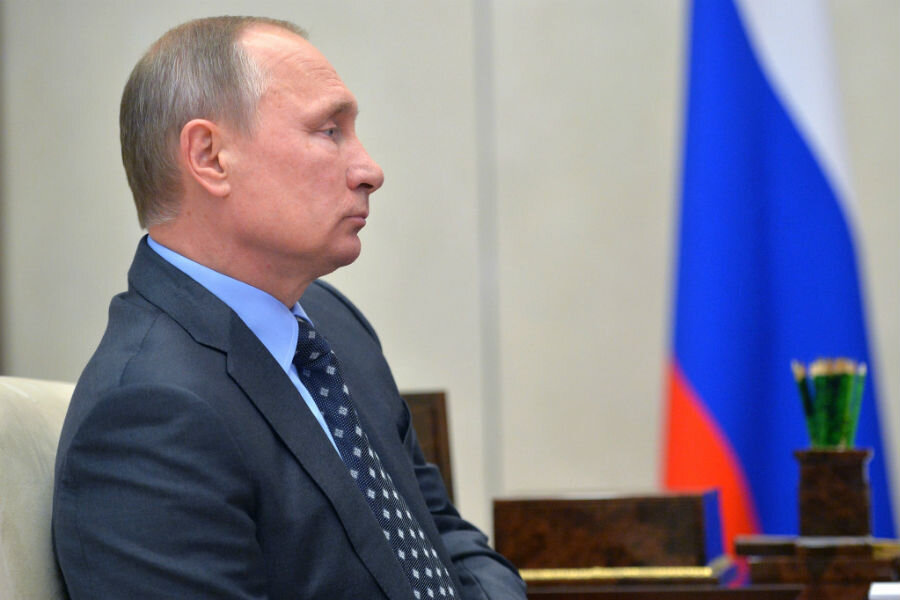Putin cancels US plutonium disposal program, reflecting widening rift
Loading...
A nuclear deal signed by the US and Russia in 2000, hailed as a step forward in cooperation between former enemies towards the common goal of eliminating cold war nuclear stockpiles, has been suspended by Russian President Vladimir Putin.
The deal, which was expanded in 2010, put both countries on a course to securely dispose of over 34 tons of plutonium, enough for almost 17,000 nuclear weapons.
But the Russian presidential edict that suspended the agreement on Monday cited "unfriendly actions" on the part of the US, but said that Russia's plutonium would still only be used for peaceful purposes. The suspension of the deal will likely further strain tensions between the two powers, which have been increasingly at odds in recent years.
During the cold war, both the US and USSR amassed huge arsenals of nuclear weapons as defense measures against each other. The highly destructive potential of these arsenals were meant to deter direct conflict between the United States and Soviet Union, since any direct war between two powers with that amount of nuclear destruction would completely wipe out both sides. After the fall of the USSR, relations between the two countries began to normalize, and portions of these stockpiles began to be eliminated.
But relations between the US and Russia have begun to sour again. The Russian presidential decree claims that "a fundamental change of the circumstances" has taken place between the two countries since 2010, according to the state-owned TASS Russian News Agency.
The increasing tension between the two superpowers stems in large part from conflicts in Crimea and Syria, with the US and Russia constantly finding themselves supporting opposing powers in local conflicts in the manner evoking Cold War skirmishes. In Syria, for instance, both countries have a common enemy in the form of the Islamic State. But the countries back different factions in the Syrian civil war, making chances of genuine cooperation between the US and Russia slim at best.
The plutonium decision follows the failure of a US-Russia ceasefire in Syria last month. Washington and Moscow continue to trade accusations over which side was responsible for breaking that agreement, even as fighting escalates around Aleppo.
"President Putin's aggression in Ukraine [and Syria] has led to international sanctions and at least a partial isolation internationally," John Herbst, the US ambassador to Ukraine from 2003 to 2006 and former director of the Center for Complex Operations at National Defense University in Washington, tells the Monitor in an email. "He blames the US for these problems and has few instruments that he can use to effectively retaliate. So he has chosen the renunciation and violation of arms control agreements as a way to express his unhappiness with US policy."
In April, Russia began to express concerns that the US was not living up to the 2010 agreement. The agreement stipulates that the plutonium is supposed to be disposed of in a specific, but expensive, way. A Mixed Oxide Fuel (MOX) Fabrication Facility in South Carolina, which would have recycled the plutonium into mixed-oxide commercial nuclear reactor fuel, was supposed to be built for $1.7 billion, but ballooned to $7.7 billion in 2013, according to RT. The facility, which is expected to cost at least $1 billion per year to operate, has yet to be completed.
As the cost and problems with the MOX facility piled up, the Obama administration proposed a different, more cost-efficient method involving diluting the plutonium and storing it in special facilities. Russia expressed concerns that the US chemical process of disposal would be easily reversible, allowing for the reclamation of weapons-grade plutonium. The Union of Concerned Scientists said in a proposal the Russian position had "little technical merit," and went on to point out that Russia's disposal approach would produce fissile material that might not be "weapons-grade" but could still be "weapons-usable" itself.
The presidential decree for the suspension could still be overruled by the Russian parliament. However, Ambassador Herbst puts those chances at "near zero," particularly as Russia looks to regain cold war-level influence.
"This suspension can be undone quickly if that is what Mr. Putin wants," says Herbst. "The US remains interested in arms control and would be ready to sit with Russia to discuss the agreements that the Kremlin has either violated or renounced. But the US is not willing to acquiesce in Moscow's aggression against Ukraine or its revisionist aims in Europe."






